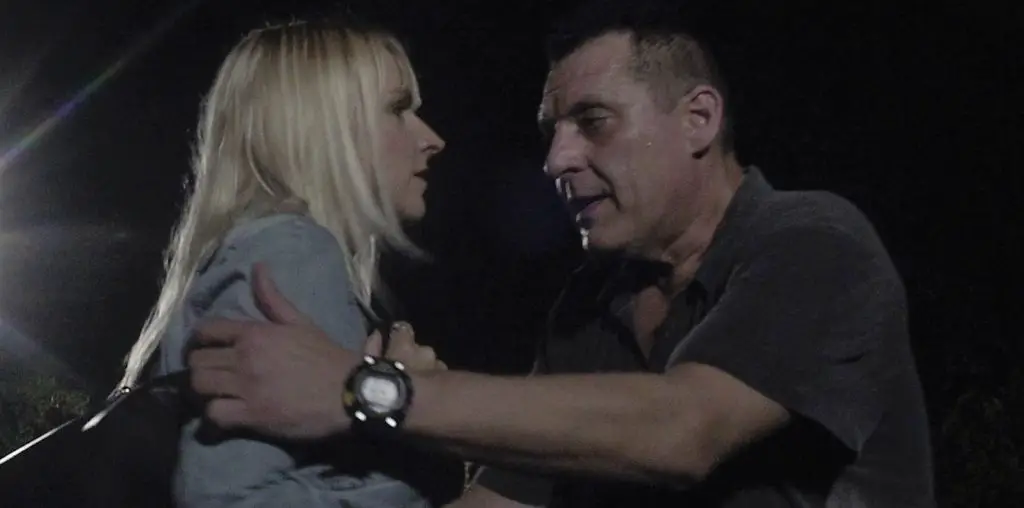
Here’s a biopic that was pretty much inevitable. Johnny Cash is/was the very definition of an American music icon. His career spanned almost 50 years, and his influence on other musicians is beyond measure. With his death in 2003, the Man in Black left a gaping hole in the music landscape that today’s perfectly coiffed, sanitized performers can never hope to fill.
Bracketed by the legendary 1968 Folsom Prison gig that would become one of his most famous recordings, “Walk the Line” first spends a little time detailing Cash’s boyhood in a dirt poor cotton farming family in rural 1940s Arkansas. As is usually the case with these films, we only hang around long enough to see the defining moment in the main character’s youth. In his case, the accidental death of Cash’s older brother Jack, or “the good one” as his music-hating father referred to him.
After a stint in the Air Force, Cash (Joaquin Phoenix) settles in Memphis with his new wife Vivian (Ginnifer Goodwin) and their baby. Life as a door-to-door salesman doesn’t really suit him, however, and he eventually finds himself at Sun Studios, where he finagles an audition with Sam Phillips. Phillips convinces Cash to ditch the gospel, and signs him on the strength of a new song Cash wrote in the Air Force called “Folsom Prison Blues.” In no time, the young man is on tour with other Sun artists like Elvis Presley, Jerry Lee Lewis, and June Carter (Reese Witherspoon).
Ever since he was a young boy, Cash had followed the careers of June and the rest of the Carter family, and when the two meet, the sparks are obvious. Thus begins a decade long pseudo-courtship as the married Cash woos June, herself going through multiple divorces. As if this wasn’t enough to put strains on his marriage, Cash also develops a fondness for booze and pills, resulting in the bottoming out of his career and family life.
Director James Mangold focuses almost exclusively on Cash’s rise to fame and subsequent struggle with drugs. This is understandable, as it is undoubtedly one of the most interesting phases of the man’s life (and certainly would’ve beat the hell out of Cash’s bible-thumping ‘70s incarnation). Unfortunately, Mangold doesn’t bring anything new to the story. Let’s face it; the whole “rise-fall-rise” angle is the very epitome of rock and roll cliché, except that this wasn’t the case when Cash was actually living it. Nevertheless, Mangold’s representation often plays like one of those bad TV movies in which Cash himself used to star. The film’s narrative never strays from Plot 101: childhood trauma – young adult struggles – early fame – self indulgence – hitting bottom – redemption, and all apparently with the singular intent of appeasing a disapproving father. Only this time, you get lots of rock and roll cameos (The Killer was apparently something of an a*****e). His pursuit of June also comes across as lackadaisical, which doesn’t quite jibe with Cash’s own accounts of his “obsession” with her. As depicted here, Cash mostly acts like a randy teenager, and June is right to turn him away for so long.
I had some doubts about Joaquin Phoenix in this role, I must admit. And while – for the most part – he captures Cash’s mannerisms and the physicality, no actor alive could imitate his presence. For this reason, it’s probably better that the movie focuses on the early years, as an older Cash would be beyond the ability of anyone to reproduce. Phoenix also did all of his own singing, and while no one will ever mistake it for Cash’s singular growl, it grows and gains strength as the movie progresses. Witherspoon is a perfectly believable June Carter, even though there’s not much to her character as written here. Her singing is also quite good. Surprisingly so.
“Walk the Line” isn’t a bad movie, just an uninspiring one. Cash is a legend, and deserving of a more thoughtful portrayal than what we’re offered here.
